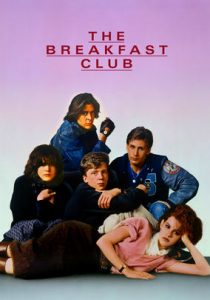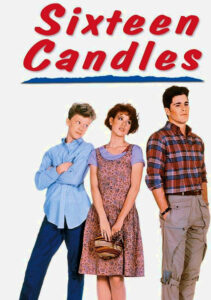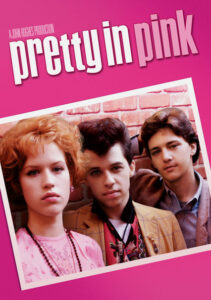The Breakfast Club-1985
Director John Hughes
Starring Judd Nelson, Molly Ringwald
Top 250 Films #131
Scott’s Review #755
Reviewed May 8, 2018
Grade: A
The Breakfast Club (1985) is one of the most beloved films of the 1980s and perfectly captures being a teenager during this time.
Containing both innocence and authenticity rarely found in films targeted at younger audiences (and there were plenty in the 1980s), the film is timeless and holds up exceptionally well, still feeling fresh.
Director John Hughes avoids cliches and creates genuine truth in cinema. The theme song, “(Don’t You) Forget About Me” is nearly impossible to hear without associating it with this film.
The storyline is uncomplicated; five high school students (Bender, Claire, Andy, Brian, and Allison) of differing social classes gather one Saturday morning in the high school library for a day of detention.
Each student appears to know the others, but only peripherally, having little in common.
Assistant Principal Vernon (Paul Gleason) assigns them to complete a thousand-word essay by the end of the day. The group engages in mischievous antics, and squabbles, and discusses their respective roles and troubles in life throughout the day.
The film looks and feels like a small independent feature rather than a big-budget offering, which is of enormous praise. The cast is very small- only the aforementioned six principles and two minor characters.
The setting is almost entirely inside the walls of a suburban high school with only a few exterior shots to speak of. Mainly what succeeds is that the characters interact with rich dialogue, good texture, and underlying insecurities that make the screenplay bristle with genuine angst.
It is tough to pinpoint who the lead characters would be, but arguably Claire and Bender (Molly Ringwald and Judd Nelson) are the pair expected to unite as a couple, as they do in the conclusion- this is predictable yet sweet.
Unexpectedly, however, the film pairs Andy and Allison (Emilio Estevez and Allie Sheedy). Both couples are complete opposites, Claire and Bender even despise each other throughout most of the film but realize their mutual attraction.
Careful not to weigh down the film with too much heavy drama, Hughes, who also wrote and produced the work, peppers in some comedic moments.
Gleason is the easy foil as the sole authority figure, a bit too dedicated to his job of humiliating and disciplining the students, but he does get his due humorously.
Either on-screen or off-screen, no adult figures are written in a positive light giving The Breakfast Club a complete teenage perspective.
But the main appeal goes to the teenagers and the message that Hughes successfully relays- that of the misunderstood young adult. Each character is unhappy in some way and feels put into a category or defined by the individual cliques they each belong to- whether they want to or not.
Hughes makes the film a treasure in terms of relating to the characters- everyone remembers high school and the insecurities wrestled with while attempting to get good grades and obtain acceptance.
Hughes brings these aspects to life with his slice-of-life tale.
Even if every character is not immediately recognized by the viewers themselves, each is empathetic nonetheless. When Andy reveals his father’s criticisms or Bender painfully recounts his father’s physical abuse, we feel for them, suddenly seeing the strong athlete or the burnout from our high school days in an entirely new way.
Mousy Allison gets a makeover from Claire and suddenly shines like a new dime- finally not being ignored. Brian’s overbearing parent’s pressures are almost too much for him to bear.
After the film, we are left to wonder what will happen on Monday morning during homeroom. Will the group continue their new friendships (or more) or simply return to the normalcy of their respective peer groups?
Hughes wisely does not satisfy our piqued curiosity but rather leaves it to our imagination.
The Breakfast Club (1985) holds appeal for the masses without feeling cliched or put upon- only feeling insightful and inspired to accept others we may have preconceived notions about.


